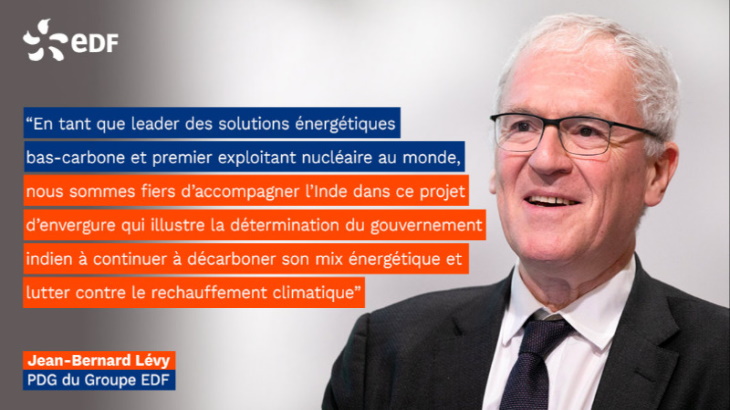French company EDF has submitted to Nuclear Power Corporation of India Ltd (NPCIL) its binding techno-commercial offer to build six EPRs at Jaitapur in Maharashtra. The offer is the culmination of work that began with the 2018 signature of an agreement between the two companies and paves the way for discussions towards a binding framework agreement.

(Image: @EDFOfficiel)
The offer includes the detailed technical configuration of the reactors, taking into consideration information on the site conditions, and the terms and conditions for the supply of engineering studies and equipment for the six reactors. It is based on the complementary skills of EDF and NPCIL, and aims to build a long-term partnership between the French and Indian nuclear industries, EDF said.
The Jaitapur plant, with an installed capacity of 9.6 GWe, would be the most powerful nuclear power plant in the world, generating some 75 TWh per year, meeting the annual consumption needs of 70 million Indian households and avoiding the emission of an estimated 80 million tonnes of CO2 per year, EDF said.
EDF Group Chairman and CEO Jean-Bernard Lévy described the submission of the offer as a "major step forward" for the EDF group and the wider French nuclear industry.
"This key milestone has been achieved thanks to the trust-based relationship built over time with our Indian partner, and the excellent collaboration and continuous efforts of the EDF and NPCIL teams. This is yet another significant step towards the materialisation of this flagship project for our great nations, and the establishment of a long-term partnership in the civil nuclear field between both our leading nuclear industries," he said.
Under the offer, EDF will provide the EPR technology, including engineering studies and equipment for the construction of the reactors, with Framatome providing engineering studies and equipment for the nuclear steam supply systems and GE Steam Power the studies and equipment for the conventional islands. These will be equipped with Arabelle steam turbines. EDF will also offer training for NPCIL's future operating teams.
NPCIL will be responsible for the construction and commissioning of the units, as well as obtaining all necessary permits and consents in India as the owner and future operator of the plant. This includes certification of the EPR technology by the Indian regulator.
EDF will not be an investor in the project, nor will it be in charge of construction, the company said. The company and its partners will, in line with India's Make in India and Skill India initiatives, work to encourage Indian industrial involvement. This will include: identifying Indian companies that could be suppliers to the project (some 200 have already been pre-qualified); setting up an engineering platform in India to carry out part of the detailed engineering studies and all execution plans; and a pre-feasibility study for the establishment of an Indian centre of excellence to train engineers and technicians and to support the development of the necessary skills set for the project.
The potential socio-economic benefits to India from the project will include around 25,000 direct local jobs during the construction phase of a pair of EPR units, and around 2700 permanent jobs would be created during the operation of the six units, EDF said. The project will also bring "significant economic benefits" for the French nuclear industry over its 15-year duration.
The Industrial Way Forward Agreement, which was signed in March 2018 by the CEOs of EDF and NPCIL, set out the industrial framework and planned timetable for the implementation of the Jaitapur EPRs, as well as the roles and responsibilities of the partners.
India currently has 23 operating nuclear reactors. Most of its installed nuclear capacity is indigenously designed pressurised heavy water reactors, although two Russian-designed and supplied VVER pressurised water reactors are in operation at Kudankulam, where two more VVERs are under construction.
Researched and written by World Nuclear News